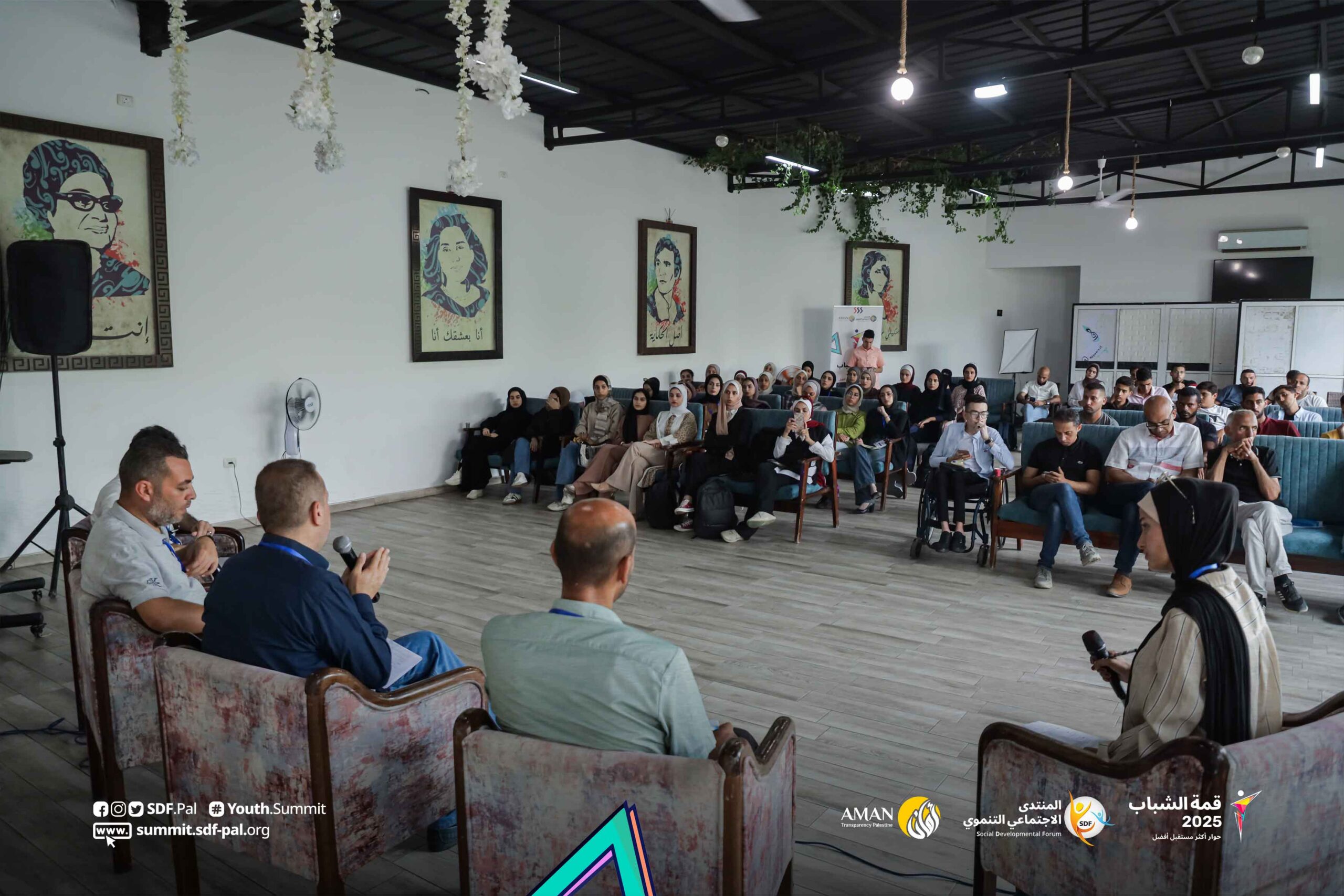Conclusion of the Youth Summit 2025 activities in Gaza… Youth: From Crisis to Leading Recovery

The Social Developmental Forum has concluded the activities of Youth Summit 2025 which was held from September 28-30, 2025 in the Middle Area of the Gaza Strip, under the slogan “Youth: From Crisis to Leading Recovery,” in partnership with the Coalition for Integrity and Accountability – AMAN.
The annual summit served as a dialogue platform that brought together Palestinian youth with decision-makers and representatives of national and international institutions, to enhance their participation in shaping community priorities and leading recovery efforts following the genocidal war that has afflicted the sector since October 7, 2023.
The summit commenced with an opening ceremony featuring welcoming remarks from the Social Developmental Forum and the Coalition for Integrity and Accountability – AMAN. The three-day program and objectives were outlined before a significant gathering of youth participants, decision-makers, local and international experts, and civil society representatives.
At the summit’s opening, Mahmoud Al-Zant, General Director of the Social Developmental Forum, stated: “This year, the summit launches amidst the ongoing genocide, the continuation of Israeli brutal practices, displacement and destruction in Gaza, and the persistence of Israeli racist practices in the West Bank governorates.”
Youth Summit 2025 comes with unwavering determination and high energy from volunteer and proactive youth to sustain youth activities and continue their role in leading dialogue, discussing issues that matter to people, tangibly enhancing youth participation, and addressing pressing issues that concern all citizens in the Gaza Strip.
Mahmoud Al-Zant, General Director of the Social Developmental Forum
Al-Zant extended his gratitude to all the youth and volunteers, the participants of Youth Summit 2025 and the graduates of Integrity School program, in addition to his deep appreciation for the efforts of the Social Developmental Forum team in the Gaza Strip, who work under difficult circumstances. He also thanked all the Forum’s partner organizations.

For his part, Dr. Nader Abu Sharekh, Vice President of the AMAN Coalition, emphasized the importance of the strategic partnership between the Coalition and the Social Developmental Forum in organizing such annual youth summits. He praised the active role of youth in leading dialogue sessions with decision-makers, highlighting their strong leadership and dialogue facilitation skills, and their ability to achieve this distinguished level of organization despite the exceptional circumstances the Gaza Strip is enduring.
Speaking about the summit, Salah Al-Rozzi, Coordinator for Youth for Integrity project and the Summit Coordinator, stated: “The Youth Summit was an extraordinary experience in every sense of the word. Despite the harsh conditions in the Gaza Strip, Palestinian youth have proven their ability to transform pain into strength, and challenges into opportunities for dialogue and collective action.”
filled with interaction and determination, reflecting the participants’ deep awareness of the importance of their role in shaping a more just and accountable future. Thanks to meticulous organizational efforts and a spirit of cooperation, we successfully achieved tangible outcomes that express the youth’s visions and aspirations for a locally-led recovery, marked by hope and a profound sense of communal responsibility.
Salah Al-Rozzi, Coordinator for Youth for Integrity project and the Summit Coordinator
Education for Hope
The summit’s first session, titled “Education for Hope” was held at Al-Asima Restaurant in Al-Nuseirat Camp in the Middle Area of the Gaza Strip, with the participation of a select group of academics, experts, and representatives from educational institutions.
The session was moderated by Shahd Abu Za’nona from the Integrity School program, with the participation of Dr. Nader Abu Sharekh, Vice President of Palestine University for Continuing Education and Community Service; Hamza Abu Aisheh, Spaces Officer at the Social Developmental Forum; Bahaa Al-Shatli, Coordinator of the Education in Emergencies group at UNICEF; and Mohammed Nassar, Project Director at the Ministry of Education.
The session addressed several key themes, most notably: the reality of education amidst destruction and displacement; youth initiatives that helped create educational alternatives; the role of innovation and technology in building a safe and equitable education system; and another theme centered on the question, “Who sets the priorities for education during the recovery phase?”

The session focused on the immense challenges facing Gaza’s education sector, where most schools have been partially or completely damaged, impacting thousands of students and teachers. It also highlighted alternative youth initiatives, such as educational spaces, and the role of technology and innovation in developing a unified Palestinian digital platform for education in emergencies.
The speakers emphasized the critical importance of involving students and youth in shaping educational policies and recovery plans, while enhancing coordination between the Ministry of Education and educational and community institutions.

Youth and Equity in Distribution
The second session, titled “Where is the Aid Going? Youth and Equity in Distribution,” was held via Zoom. It addressed the mechanisms for distributing humanitarian aid in the Gaza Strip, the existing gaps, and the tools available to youth for monitoring and community accountability.
The session was moderated by Rola Ashour, an Integrity School program graduate, with participation from Dr. Fedaa’ Soboh, Director of the Meeting Point for Field Hospitals, Kitchens, and Restaurants at World Central Kitchen, Ali Abdul Wahab, Monitoring and Evaluation Officer at the Social Developmental Forum, and Wael Balousha, Regional Director of the Coalition for Integrity and Accountability – AMAN.

The discussion focused on aid distribution mechanisms and existing gaps, alongside the role of youth in community monitoring and the digital documentation of violations. Emphasis was placed on the necessity of establishing a central data collection network, accurately assessing needs prior to aid distribution, and adopting monitoring tools and methodologies that ensure equity and accountability.
How Do We Organize Humanitarian Work Amid Chaos?
The third session, titled “Displacement Camps: Organizing Humanitarian Work Amid Chaos,” featured substantive discussions on the reality of displacement camps and the equity of aid distribution mechanisms within them.
The session was moderated by Ru’aa Abu Abadi, with participation from Hani Al-Ramlawi, Director of Development and Strategic Partnership for Palestinian Agricultural Relief; Amjad Al-Shawa, Director General of the Palestinian NGO Network – PNGO, and Hussam Soboh, Project Coordinator at the Social Developmental Forum.

The session examined the reality of internal displacement in Gaza, challenges in managing displacement camps, the role of youth in the field response, and pathways to building a more efficient humanitarian management system.
Speakers emphasized the need to unify a database for the displaced, establish binding standards for camp management, and empower youth to participate in planning and organizing. Additionally, they stressed the importance of shifting towards a sustainable developmental response that provides dignified housing solutions such as adequate tents and caravans.
Key Recommendations
The latest edition of the Youth Summit produced numerous recommendations, synthesized by the session rapporteurs from extensive and thorough discussions held among attendees, guests, and youth participants. The summit strongly affirmed the following:
- Enhance coordination between the Ministry of Education and educational and community institutions to ensure efforts are complementary.
- Support and expand educational spaces as youth-led initiatives to safeguard the continuity of education and protect students’ right to learn.
- Develop a unified Palestinian digital education platform for emergencies.
- Directly involve students and youth in shaping educational policies and recovery plans.
- Unify databases related to displaced people and improve the mechanisms for distributing humanitarian aid.
- Engage youth in the management and planning of community and humanitarian initiatives to ensure the sustainability of these efforts.
A Rewarding Experience
We asked DR. Talal Abu Rukbeh, one of the summit’s trainers involved in preparing the youth to lead its dialogues, for his reflections following its conclusion. He stated: “The Youth Summit was a resounding success. The youth performed creatively, particularly in managing dialogue, discussions, and facilitating the sessions. The atmosphere was highly interactive, especially given that this year’s summit tackled sensitive and critical topics like education, displacement, and aid.”
The youth successfully delivered the message and amplified the people’s voices to all officials through effective dialogue in the sessions. The engagement from the participating youth was remarkable, and their efforts were truly outstanding.
DR. Talal Abu Rukbeh, one of the summit’s trainers involved in preparing the youth to lead its dialogues
Young participant Marah Al-Zant shared her experience as a speaker: “My participation in Youth Summit 2025, where I delivered the closing statement, was truly an eye-opening experience. It revealed how we, the youth of Gaza, aren’t waiting for change… we are creating it. Despite all circumstances, we don’t wait for anyone to give us a platform to speak—we create it through our determination, because our voices can transform pain into hope and chaos into an organized force that rebuilds society.”
Honestly, the Youth Summit exceeded all expectations by every measure! We anticipated ordinary discussions, but what transpired was a genuine spark that ignited ideas and shifted paradigms. When we came together, we proved our energy isn’t just talk. We are a generation making a difference and building for tomorrow, and this was just the powerful beginning.
Abdulrahman Shubair, who served as session rapporteur
Rola Ashour, one of the summit’s dialogue facilitators, noted: “The Youth Summit was an exceptionally distinguished event. My role in representing youth voices gave us the opportunity to speak, express our opinions, and discuss critical topics like aid distribution while hearing directly from decision-makers. It reinforced the crucial importance of empowering and involving youth in decision-making.”

Hala Hamdan, an attendee who expressed profound admiration for the discussions, shared: “I attended a Youth Summit session about the importance of education under difficult circumstances. The conversation highlighted that education is a non-negotiable right, no matter the challenges. Specialists in education provided deep insights into the current crisis and potential solutions for revitalizing the sector. The presenters were outstanding, facilitating the session with a positive spirit and a moving style full of hope.”
More Dialogue… A Better Future
The Youth Summit is an annual platform organized by the SDF in partnership with AMAN over several years, designed to highlight Palestinian youth perspectives on national and community issues and enhance their participation in public policy-making.
This edition of the summit focused on empowering youth to play a leading role in recovering from the impacts of war. This was achieved through dialogue sessions, workshops, and preparatory training organized by the Integrity School, which aimed to strengthen integrity, accountability, and youth empowerment in monitoring, documentation, and community participation.
The summit concluded with organizers reaffirming the critical importance of empowering youth and local communities as essential partners in managing educational and humanitarian processes. They emphasized the necessity for solidarity between the government, educational institutions, and civil society to ensure educational continuity and equitable access to humanitarian aid, while transforming youth initiatives into genuine pillars for recovery and the rebuilding of Gaza on more just and sustainable foundations.

